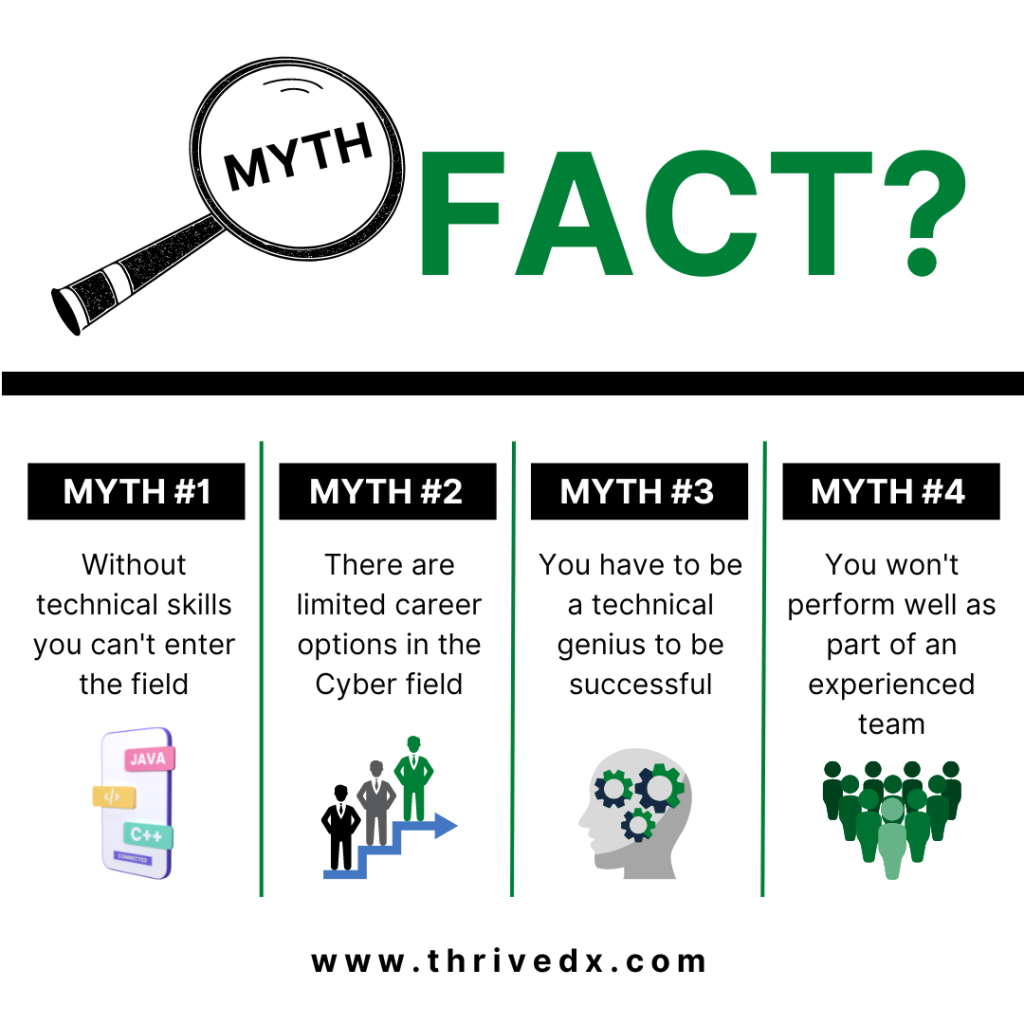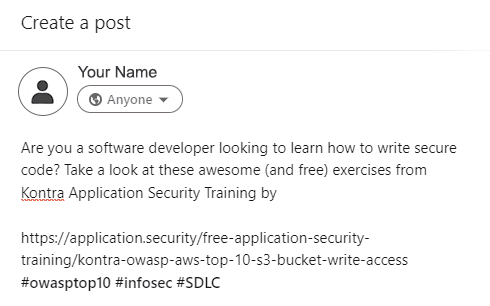Cybersecurity is a fast-growing industry with a rapid-growing skills gap. It’s estimated that by 2030, the talent shortage and skills gap in the U.S. alone is expected to total a loss of $8.5 trillion. Cyber bootcamps, degrees, and certifications are all reasonable paths to break into the high-paying and in-demand digital skills industry. However, before taking the steps to break into this new field, it’s important to demystify any connotations that might veer interested people away from this industry. Well, let’s explore the top myths and fears surrounding getting into the digital skills field.
“In your first job, you have to master communicating on a team and sharing the load. Everything that you do passes to others so your actions affect other people codependent on your task. This is why you must communicate and pay attention.” — Information Security Analyst at Equifax.
Myth #1: If you don’t have technical skills, it’s too late to enter the digital skills field or advance your career.
This is the biggest barrier young professionals struggle with when debating whether or not to enter the cybersecurity field. The shift from college projects and classes to performing high-stakes incident reporting and defensive security can be jarring when first starting out. The key to getting to the bottom of your fear and overcoming imposter syndrome is to remember that your technical skills are only a percentage of the profession.
Some of the highest valued skills that employers look for in new team members are transferable skills, such as the ability to communicate, resilience and persistence, and the desire to continue to learn and improve. You do not have to learn from scratch, and you will not be forced to take roles below your skill level because of your background. Hone in on your current skills, ask your manager to help you figure out the direction you want to steer your career, and you will be on your way to career advancement just like senior professionals on your team.
Myth #2: There are limited options in the cybersecurity field.
A common misconception is that cybersecurity jobs are either at tech companies or are hacker roles. This is not true. The cybersecurity field is vast in scope with many different specializations and niches. Take the initiative to jump in on varying projects to hone your skills or learn new ones. Not learning or practicing will be the difference between ending up in a field you don’t like and figuring out what your true passion is.
Your cybersecurity career path can take on many faces. Within the cybersecurity field, careers fall into categories that either focus on solving technical problems or human ones. Roles that come to mind include everything from information analysts and security architects to ethical hackers. But non-technical roles are also prevalent, including roles like technical writers, policy analysts, and trainers. New professionals should also consider that cybersecurity exists in many forms across industries. Big tech might be the career ambition for new professionals, but healthcare, banking and financial institutions, education, government, and utility companies are also facing an increasing number of cybercrime, opening up a wealth of open cybersecurity jobs for flexible career paths.
Myth #3: You have to be a tech genius or mathematician to be successful.
Not all cybersecurity professionals enter the field from an IT background or have an affinity for numbers. Career changers are common, just as each new wave of candidates entering the workforce bring different skills to meet varying business needs. The main focus of any cybersecurity professional is problem solving and analytics, demonstrating the ability to get to the center of any unresolved issues with both urgency and skill.
New professionals should also keep in mind that most entry-level cybersecurity jobs do not require highly technical qualifications such as coding skills, which can be learned over time as one progresses in their career towards mid- and senior-level roles. Once you buckle in for the long haul, take your first step by learning the basics of information systems and applications before taking the deep dive into things like networks and infrastructure.
Myth #4: You won’t perform well as part of the cybersecurity team.
Make no mistake, the day-to-day tasks during your first year in an IT role will seem daunting. You might fret over missing a miniscule detail that you should have noticed right away. You might doubt that you know enough from your background or your training if you have any, or you might be afraid that you can’t keep up with the junior and senior level members of your team. You might be anxious about rookie mistakes, such as creating an incident for a non-critical thing, or you might even question whether the field is for you after a rough week. These thoughts and emotions are normal to experience, and you would be a robot if you didn’t experience at least one of these at some point. But the key here is not to remain stuck in your belief that underperformance will be your norm. Instead, focus on what you do well and what you can do to boost your confidence as a contributing member of your team. Find a mentor, study which projects went great and why, and maintain a work ethic that keeps you both energized and recognized as a valuable team member all on your own.
Getting into the digital skills field and searching for your first cybersecurity job can be exhilarating once you know what to expect from naysayers and sometimes your own inner critic. The only failures that are for certain, are the opportunities you never take.
For more information about upskilling through online training and access to industry professionals, visit our website.


